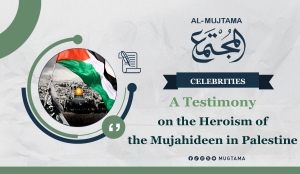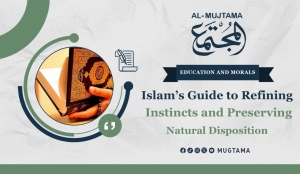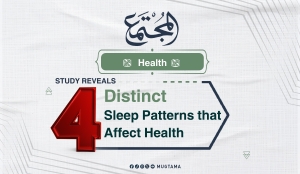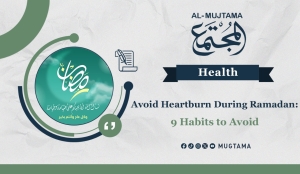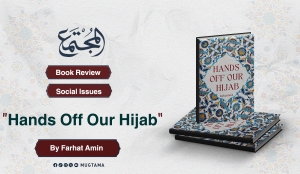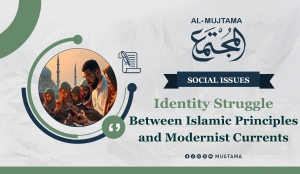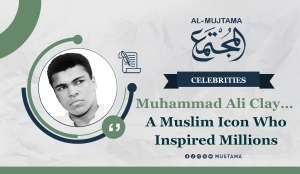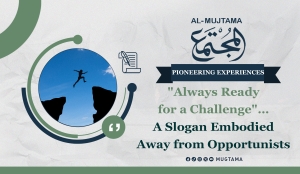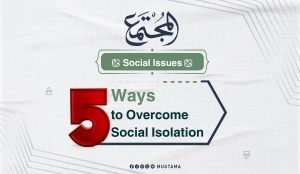Hadeel
A Testimony on the Heroism of the Mujahideen in Palestine
March 16, 2025This is an eyewitness testimony about the heroism of the Mujahideen from the Muslim Brotherhood in Palestine, as recounted by its author: "This is my testimony… I feared concealing it and being among those about whom Allah Almighty said: 'And do not conceal testimony, for whoever conceals it—his heart is indeed sinful' (Al-Baqarah: 283). I also disliked publishing it during my lifetime, lest it diminish any reward I seek solely from Allah. Therefore, I have instructed that it be published after my passing, hoping that others may benefit from it."
This is how the late Egyptian preacher, Hassan Al-Jammal, began his eyewitness account in his book Jihad of the Muslim Brotherhood in the Canal and Palestine, published in 2000. In it, he documented his memories of the Brotherhood’s battles and heroic stances against the Zionist enemy.
Al-Jammal narrates the beginnings of his life and upbringing, offering a brief account of his family background. He describes how he grew up in the Manial Al-Roda neighborhood of Old Cairo and the moment he first saw the Muslim Brotherhood’s scouts marching in disciplined formation, wearing their unified attire. This sight drew him to the Brotherhood’s branch in Manial, where he took his first steps with the blessed movement.
The late Al-Jammal, who passed away in 1998, recounts that he joined a youth group within the Brotherhood, participated in various activities and faith-building camps, and regularly attended the Tuesday lesson of the martyred Imam Hassan Al-Banna. He speaks of how deeply he was influenced by Al-Banna’s words, which touched the hearts of listeners, and how he cherished performing night prayers behind the esteemed Sheikh Sayyid Sabiq, the author of Fiqh As-Sunnah.
The author explores different aspects of the Muslim Brotherhood’s commitment to the Palestinian cause—spiritually, politically, financially, and militarily. He highlights Al-Banna’s letter to Haj Amin Al-Husseini, the Grand Mufti of Jerusalem, expressing his concern for Palestine, as well as a second letter sent to the Islamic Conference in Jerusalem in 1929.
In August 1933, the Muslim Brotherhood sent its first delegation to spread its message outside Egypt, with Palestine being the first destination. Following this visit, the Brotherhood’s headquarters in central Cairo became a hub for Palestinian jihad leaders.
Al-Jammal’s testimony delves into the resolutions of the First Arab Conference for Palestine, organized by the Brotherhood in 1938, which concluded with recommendations urging Arab and Muslim governments to intervene to save Palestine from the British-Zionist conspiracy. This led to communication with the Secretary-General of the Arab League, Abdel Rahman Azzam Pasha, and the formation of the Palestine Rescue Front.
A fundraising campaign quickly began, accompanied by protests and demonstrations, and Al-Banna announced the mobilization of 10,000 volunteers for jihad in support of Palestine and Al-Aqsa. Al-Jammal was among those who joined the training camps, undergoing medical examinations and military drills, learning how to use weapons, engage in combat tactics, and conduct guerilla warfare. Despite his family’s objections, he insisted on joining the fight in Palestine.
Al-Jammal details the formation of the Brotherhood’s battalions, listing the names of officers and soldiers, and describes the journey to Sinai and the crossing into Palestine on April 28, 1948. Upon reaching Khan Yunis, they were greeted with ululations, celebrating the arrival of Egyptian Mujahideen to confront Zionist militias.
Regarding the first martyr, Al-Jammal recounts how, in their first engagement against enemy militias, Fathi Al-Khouli, from the Brotherhood’s branch in Sayyida Zainab, Cairo, was martyred—becoming the first martyr of the first battalion. He was buried in a military funeral in Khan Yunis.
As for the Kfar Darom battle, it became a stage for extraordinary heroism. One such act of bravery was that of Omar Othman from the Brotherhood’s Alexandria branch, who threw himself onto barbed wire laced with explosives, causing it to be blown apart and creating a passage for his fellow Mujahideen. However, tactical errors in executing the attack plan led to the martyrdom of 46 fighters in that battle. Al-Jammal recorded their names to honor their memory.
Born in 1930, the author provides detailed accounts of other military operations and heroics, while also shedding light on some strategic mistakes—such as the dispersion of volunteer forces, shortages of arms and ammunition, premature attacks, and insufficient reconnaissance of the enemy. He also discusses how the acceptance of a ceasefire on June 8, 1948, allowed the Zionists to reorganize and strengthen their forces, ultimately leading to the Arab armies’ defeat, the dissolution of the Muslim Brotherhood, and the assassination of Al-Banna on February 12, 1949.
Al-Jammal’s testimony includes anecdotes from times of hardship, heroic moments, and stories of Brotherhood martyrs in Palestine. He then shifts focus to their struggle against British occupation in the Suez Canal, describing how the Brotherhood orchestrated economic blockades against British soldiers, cut off food supplies to their camps, bombed their ammunition depots, and sabotaged railway lines to disrupt their supply routes. He also details the Battle of Tel Al-Kabir on November 9, 1951, and commemorates Brotherhood members who were martyred in battles against the British in the Canal region.
-------------------------------------------------------------
In an era where information flows without limits and small screens have become tireless, hidden educators, the role of sexual education grows as a defensive barrier that preserves innate human nature and directs human instincts along the right path. However, sexual education in Islam is not merely about providing dry information about the body and its functions; rather, it is a comprehensive educational system built on modesty, instilling values, and helping individuals achieve psychological and social balance within the framework of Islamic guidelines.
Between the Islamic Perspective and the Western Perception
There has always been confusion between sexual education in the Islamic perspective and the one presented in Western curricula, which often separate sex from morality and present it detached from values. However, in Islam, the matter is not just about providing individuals with information but rather preparing them psychologically and ethically to handle this instinct properly—viewing sex as a responsibility rather than mere indulgence, and as a sacred trust rather than a cheap commodity.
From this standpoint, sexual education does not aim to provoke curiosity or provide excessive details. Instead, it seeks to build intellectual and behavioral immunity that protects young people from being swept away by misguided concepts and shields them from the deviations warned against in the divine law, as Allah says: "And do not approach unlawful sexual intercourse. Indeed, it is ever an immorality and is evil as a way." (Al-Isra: 32)
Education as a Gradual Process, Not a Sudden Imposition
Islam did not introduce its teachings in this regard abruptly but rather established a gradual methodology that aligns with human nature and considers the stages of physical and mental growth. Thus, raising children in this aspect is not done all at once but is built step by step—starting with teaching them the etiquettes of seeking permission, then introducing them to physiological changes, and finally guiding them toward marriage as a legitimate safeguard that protects hearts from being lost, bodies from diseases, and societies from disintegration and moral decay.
First Stage (Ages 7-10)
At this age, children do not need to learn details about sexual relationships; rather, they need to be introduced to foundational values such as cleanliness, the etiquettes of seeking permission, and the necessity of sleeping separately—principles established by the Prophet ﷺ in his saying:"Arrange their beds (to sleep) separately." (Narrated by Abu Dawood)
During this stage, children must develop a sense of modesty, ensuring they do not expose themselves inappropriately or intrude upon the privacy of others, in adherence to Allah’s command: "Tell the believing men to reduce [some] of their vision and guard their private parts." (An-Nur: 30)
Second Stage (Ages 10-18)
Upon reaching puberty, adolescents undergo physical and psychological changes that may confuse them. At this stage, parents play a crucial role in providing accurate information—neither exaggerating nor downplaying its importance. It is impermissible to leave them searching for answers in unreliable sources, nor should they be overwhelmed with premature details. Instead, knowledge should be given according to their needs while emphasizing Islamic guidelines and warning against prohibited acts, as Allah says: "But let them who find not [the means for] marriage abstain [from sexual relations] until Allah enriches them from His bounty." (An-Nur: 33)
A powerful example of Islam’s approach in addressing human nature is the story of the young man who came to the Prophet ﷺ asking for permission to commit adultery. The Prophet did not scold him but gently asked: "Would you like that for your mother?", The young man replied, "No.", The Prophet then said, "Likewise, people do not like it for their mothers.", The Prophet then prayed for him, and the young man left without any desire for such an act. (Narrated by Ahmad)
In stark contrast, if one were to ask a young man in the West today, "Would you accept this for your mother?" he might respond, "Why not?"—for the innate deterrent has been buried under the corruption of a culture that has distorted the concept of chastity, erased all moral boundaries, and stripped instincts of their human essence.
Third Stage (18+ Years)
When a young man or woman reaches the age of marriage, they need a deeper understanding of marital relationships—not just from a physical perspective but as a solemn covenant based on love and mercy, rather than a temporary attachment or a fleeting affair as modern media often portrays.
The Companions would ask the Prophet ﷺ about matters of marital life, and he never turned them away but instead guided them toward preserving relationships within the correct framework. One example is when Umar ibn Al-Khattab, may Allah be pleased with him, said:"I am ruined!", The Prophet ﷺ asked, "What ruined you?", Umar replied, "I had intercourse with my wife from behind (not in the normal way)." Then, Allah revealed the verse: "Your wives are a place of sowing seed for you, so come to your place of cultivation however you wish." (Al-Baqarah: 223). The Prophet ﷺ then advised: "Approach (your wife) from the front or the behind, but avoid the anus and intercourse during menstruation." (Narrated by At-Tirmidhi)
Islamic Sexual Education: A Stronghold Against Deviation
While some may believe that sexual education is merely about discussing the body, Islam presents a broader concept—linking it to faith, modesty, and ethical principles. It is not a call for unrestrained freedom but a means of protecting natural human disposition from corruption and directing instincts within the legitimate framework. Thus, a young person is neither left as prey to lusts nor suppressed to the point of explosion, but rather guided according to the wisdom of Islamic law.
For this reason, sexual education is not solely the responsibility of parents but a collective duty shared by scholars, educators, and decision-makers—so that generations are raised with awareness and society is safeguarded from moral corruption. The Prophet ﷺ said: "All of you are shepherds and each of you is responsible for his flock." (Agreed upon)
Islamic sexual education remains a unique model that balances instruction and discipline, knowledge and modesty, rights and responsibilities. It does not instill pathological shyness but preserves natural modesty; it does not provoke curiosity but provides knowledge in a measured manner; it does not promote immorality but channels instincts along the right path.
In a world overwhelmed by desires and dominated by a culture of moral decay, Islamic education remains the last stronghold that safeguards human nature, preserves society, and restores human dignity—not as a slave to his desires but as a servant of Allah.
Read Also: Youth Hard Choice of Sexual Temptations or High Marriage Costs
-------------------------------------------------------------
Sources:
1. Encyclopedia of Mahasin Al-Islam
2. IslamWeb
3. Islam Question and Answer
4. Alukah Website
Study Reveals 4 Distinct Sleep Patterns that Affect Health
March 10, 2025A new study has identified four different types of sleep patterns and explained how each affects a person's long-term health.
According to the study, led by a team from Penn State University, each type of sleep pattern impacts health differently. Researchers classified sleepers into four distinct categories based on various conditions and metrics:
1. Good sleepers: They maintain a healthy sleep routine with optimal consistency in timing and duration, satisfaction, daytime alertness, and efficiency in both sleeping and waking.
2. Sleepers who compensate for short sleep durations: They generally have shorter-than-average sleep durations but make up for it on weekends or non-working days.
3. Insomniacs: They struggle with falling asleep, experience daytime fatigue, and take a long time to sleep.
4. Short sleepers with frequent naps: They sleep for short durations but generally have good sleep patterns with frequent daytime naps.
The study found that more than half of the participants either suffered from insomnia or were short sleepers, indicating suboptimal sleep patterns. Those with persistent insomnia for over 10 years were more likely to develop various chronic health conditions, including cardiovascular diseases, diabetes, and depression.
It is worth noting that there are healthy sleep habits individuals can adopt to improve their sleep, such as avoiding mobile phone use in bed, exercising regularly, and avoiding caffeine in the late afternoon.
-------------------------------------------------------------
Avoid Heartburn During Ramadan: 9 Habits to Avoid
February 28, 2025Many people face challenges during Ramadan due to heartburn and acidity in the stomach. Although the causes of this condition vary, most can be traced back to poor dietary habits.
Here are 9 reasons that cause heartburn during Ramadan:
1- Consuming large amounts of food at iftar and suhoor leads to an increase in stomach acidity and heartburn after eating.
2- Eating excessive amounts of fatty foods can raise stomach acidity and cause heartburn.
3- Overindulging in traditional sweets that contain high amounts of fat can increase the likelihood of heartburn.
4- Inactivity and sleeping immediately after eating can cause acid reflux and heartburn.
5- Stopping the intake of antacid medications before fasting may increase the chances of experiencing heartburn.
6- Excessive smoking can lead to an increase in stomach acidity and cause heartburn.
7- Weight gain during Ramadan due to excessive food consumption and reduced physical activity may raise the likelihood of heartburn.
8- Preparing acidic juices in large quantities can cause heartburn among fasting individuals.
9- Drinking excessive amounts of coffee can lead to increased stomach acidity and heartburn.
Avoiding these poor dietary habits and following a balanced diet can help reduce the occurrence of heartburn during Ramadan.
-------------------------------------------------------------
Source: Medical website.
Book Review: “Hands Off Our Hijab” By Farhat Amin
February 27, 2025In Hands Off Our Hijab, Farhat Amin exposes the hypocrisy of liberal feminism and human rights discourse when it comes to Muslim women, particularly in the face of hijab bans across Europe. She critiques the silence of prominent progressive figures, such as Kamala Harris and Michelle Obama, who advocate for women's rights yet fail to condemn state-sanctioned Islamophobia. Highlighting the inconsistency of liberal values, Amin argues that true solidarity for Muslim women comes from within the Muslim community, rooted in Islamic teachings. She calls for a response grounded in the Quran and Sunnah, reminding Muslim women that their hijab is a divine command, not a societal choice. As she articulates, the struggle against such discrimination must be anchored in faith: "The believers in their mutual kindness, compassion, and sympathy are just like one body. When one of the limbs suffers, the whole body responds to it with wakefulness and fever" (Bukhari and Muslim).
A VERY FRENCH INQUISITION
The author exposes the French government's aggressive crackdown on Muslim identity under the guise of secularism (laïcité). She details how the 2021 "anti-separatism" law systematically targets Muslims—banning homeschooling, restricting religious schools, and criminalizing hijab-wearing for minors—while forcing imams to pledge loyalty to the Republic. Amin argues that these measures mirror France’s colonialist past, aiming to forcibly assimilate Muslims by dismantling their faith-based institutions. She highlights the hypocrisy of so-called "liberation" efforts, noting how Muslim women's voices are excluded from the debate. The chapter calls for global Muslim solidarity to resist this state-backed Islamophobia.
HISTORICAL UN-VEILING OF MUSLIM WOMEN BY COLONIALISTS
Exploring the colonial legacy of forcibly unveiling Muslim women, reveals how European imperialists weaponized feminist rhetoric to undermine Islamic values. Amin examines how figures like Lord Cromer in Egypt and the French in Algeria used forced assimilation and propaganda to dismantle Muslim identity, portraying hijab as a symbol of oppression while paradoxically suppressing women's rights in their own societies. The chapter draws parallels to modern-day Western interventions, exposing the hypocrisy of using "women's liberation" as a pretext for military and ideological domination. Amin warns against adopting secular feminist narratives that distort Islamic teachings, reminding Muslims that true empowerment lies in adherence to divine guidance.
TIME TO PLAY OFFENCE AGAINST THE ANTI-HIJAB SQUAD
Amin addresses the challenges posed by progressive Muslim reformists who attempt to reinterpret Islamic teachings, particularly regarding hijab. She critiques prominent figures like Amina Wadud, Mona Eltahawy, and Asra Nomani, arguing that they distort Islamic principles to align with secular feminist and liberal ideologies. She also highlights that such reformists not only reject hijab but also advocate for LGBTQI+ acceptance, interfaith marriages, and female-led prayers, often gaining support from Western institutions that seek to reshape Islam. She warns that their influence, though marginal within the Muslim community, can mislead those unfamiliar with Islamic scholarship.
Amin reinforces the obligation of hijab by citing classical Islamic scholarship and Quranic verses, particularly (Surah An-Nur:31), which commands believing women to cover their adornments: "And tell the believing women to reduce [some] of their vision and guard their private parts and not expose their adornment except for what is apparent and let them draw their head covers over their chests..." (An-Nur:31). She emphasizes that the consensus among scholars throughout history has affirmed the hijab as a mandatory aspect of Islamic dress, countering modern attempts to redefine its significance.
CRITIQUING HEAD-SCARVES AND HYMENS BY MONA ELTAHAWY
Farhat Amin critiques Mona Eltahawy’s Headscarves and Hymens, arguing that Eltahawy’s views are deeply entrenched in Western liberalism rather than Islamic principles. Eltahawy, a self-described "secular, radical feminist Muslim," advocates for a social and sexual revolution in Muslim societies, equating women's liberation with the rejection of religious and cultural traditions. Amin acknowledges the real injustices faced by women in some Muslim countries but attributes these issues to the absence of true Islamic governance rather than Islam itself. She highlights how Eltahawy’s perspective aligns with colonial narratives that historically sought to undermine Islamic societies by dismantling family structures and imposing Western ideals. Ultimately, Amin challenges the premise that Muslim women’s empowerment must come through secularism, emphasizing instead the importance of adhering to divine guidance: "And do not approach unlawful sexual intercourse. Indeed, it is ever an immorality and is evil as a way." (Al-Isra’: 32) This verse is a reminder that Islamic values are designed to preserve morality and societal well-being, contrasting with Eltahawy’s call for unrestrained liberalization.
MATERIAL GIRLS
Farhat Amin critiques the commercialization of modest fashion, highlighting how major brands have capitalized on the hijab while stripping it of its Islamic essence. She explores how Muslim women once prioritized hijab as an act of obedience to Allah, but today, the fashion industry promotes it as a consumerist trend, detaching it from its religious roots. The author warns against the influence of Western brands and social media in redefining modesty through a secular, profit-driven lens, leading to the sexualization of hijab and unrealistic beauty standards. She calls for a return to Islamic principles in dress, emphasizing that modesty should align with Shariah, not personal or capitalist interpretations.
TOO AFRAID TO WEAR HIJAB?
Farhat Amin challenges the argument that Muslim women may abandon the hijab due to fear of harassment, emphasizing that the principle of dharura (necessity) should not be misapplied. She underscores that while fear is subjective, true dharura only applies in life-threatening situations where migration is not possible. The author draws from Islamic history, showing that early Muslims faced persecution but remained steadfast, and argues that abandoning hijab out of fear can weaken the Muslim community. Instead, she encourages reliance on Allah, legal protections where available, and collective resistance against Islamophobia. She reinforces this with the Quranic verse: “Do the people think that they will be left to say, ‘We believe,’ and they will not be tried?” (Al-Ankabut: 2), stressing that trials are a test of faith, and perseverance leads to divine reward.
GOOD HIJABIS SHATTER STEREOTYPES
Amin critiques the Western narrative of the "good hijabi" versus the "bad hijabi." She argues that while hijabi representation in the media has increased, it is carefully curated to align with liberal secular values. Figures like Malala Yousafzai and Amani Alkhatahtbeh are elevated because they promote feminist and progressive ideals, whereas traditional hijabis who adhere strictly to Islamic teachings and challenge Western foreign policies are marginalized. The author exposes how governments and media platforms, such as SuperSisters and This is Woke, attempt to reshape Muslim identity through state-sponsored initiatives. Drawing parallels with Malcolm X’s analysis of racial representation, Amin warns Muslim women against blindly accepting media-endorsed role models. She urges them to seek guidance from Islam rather than external influences, reinforcing her argument with Quranic verses, including: "Never will the Jews or Christians be pleased with you, until you follow their faith. Say, 'Allah’s guidance is the only true guidance'" (Al-Baqarah:120).
INDIA & THE HIJAB BAN
Farhat Amin examines the 2022 hijab ban in Karnataka, India, as a targeted attack on Muslim women under the guise of secularism and uniformity. Amin details how the ban quickly spread across districts, fueled by right-wing Hindu nationalist groups, and led to harassment, exclusion, and even apartheid-like conditions for hijabi students. The court’s justification—claiming that the hijab is not an "essential religious practice"—is critiqued as an arbitrary imposition of non-Muslim perspectives on Islamic jurisprudence. The author also contextualizes this within India's broader history of Islamophobia, highlighting state-backed discrimination, mob violence, and systemic marginalization of Muslims.
Amin argues that the hijab ban is part of a larger pattern of erasing Muslim identity and oppressing Muslim women, despite the claim of "liberating" them. She warns against accepting the framing of religious rights based solely on essentiality, emphasizing that Muslims should have the freedom to practice both obligatory and non-obligatory aspects of their faith. She underscores the importance of resisting such discriminatory policies, citing the Quranic verse: “And they will continue to fight you until they turn you back from your religion if they are able.” (Al-Baqarah:217) to highlight the persistence of efforts to undermine Islamic identity.
-------------------------------------------------------------
4 Tips to Get Rid of Premature Graying
February 25, 2025Did Signs of Graying Appear Early on You? Are You Really Still Young?
You look much older! I thought you were in your sixties, but I was surprised to learn that you haven’t even reached forty yet!
How many times have you heard such comments before? How many times have you stood before the mirror, wondering about the signs of graying invading your features? How often have you felt that your youth has been taken from you before you’ve even fully lived it? Does this gray and white hair spreading on your head bother you?
Allah Almighty says: "Allah is the One who created you from weakness, then made after weakness strength, then made after strength weakness and white hair. He creates what He wills, and He is the Knowing, the Competent." (Ar-Rum: 54)
The noble verse outlines the stages of human growth: before weakness and graying, there is a stage called “strength,” which is what we refer to as youth. Ideally, a person should not transition to the stage of graying before completing the stage of strength.
However, many factors cause signs of graying to appear prematurely. Have you ever researched these causes to preserve what remains of your youth? Or are you still wondering how time has passed and when these signs appeared? Do you know that premature graying is not solely due to aging?
Numerous studies confirm that premature graying is not just a result of aging but is also caused by several factors such as stress, anxiety, depression, excessive thinking, and regret.
Researchers conducted a study on the causes of graying among a group of young individuals, and participants reported that these signs appeared after experiencing a psychological crisis. The study also found that the graying process began to reverse once participants overcame their crises and took time to rest, stabilizing their mental health.
Graying is a gradual process, not a sudden one, according to a study conducted by Luria on a sample of participants aged 45 to 65. The study found that 74% of the sample showed signs of graying, with gray hair covering 27% of their heads. It also revealed that 1 in 10 individuals did not develop gray hair even after surpassing the age of 60.
Here Are 4 Essential Tips to Prevent Premature Graying:
1. Reduce Stress and Anxiety:
More than 275 million people worldwide suffer from anxiety disorders! Often, sorrow and distress overwhelm your heart, and anxiety and stress dominate your mind. You regret the past, fear the future, and burden yourself with concerns too heavy to carry. You feel that youth is slipping away quickly, and soon, the signs of graying appear. At that moment, you will regret the moments wasted in worry and stress.
If you struggle with grief, sadness, or other unhelpful psychological disorders, you must rid yourself of them, as they will inevitably lead to premature graying and rob you of your youth.
Thus, the Prophet ﷺ was keen to overcome any sadness or worry because he understood its dangers. He said in a hadith narrated by Ibn Mas’ud: "No one experiences anxiety or grief and says: O Allah, I am Your slave, and the son of Your male slave, and the son of your female slave. My forehead is in Your Hand (i.e. you have control over me). Your Judgment upon me is assured, and Your Decree concerning me is just. I ask You by every Name that You have named Yourself with, revealed in Your Book, taught any one of Your creation, or kept unto Yourself in the knowledge of the unseen that is with You, to make the Qur'an the spring of my heart, and the light of my chest, the banisher of my sadness, and the reliever of my distress – but Allah will remove his distress and replace his sorrow with joy."
2. Don’t Overburden Yourself:
The Prophet ﷺ forbade a person from overburdening themselves beyond their capacity or forcing themselves to do things they cannot handle, even in acts of worship!
The Prophet ﷺ said to Abdullah ibn Amr when he learned that he fasted every day, prayed all night, and finished the Quran in one night: "Do not do so; Offer prayer at night and also sleep; Fast for a few days and give up fasting for a few days because your body has a right on you, and your eye has a right on you, and your guest has a right on you, and your wife has a right on you."
If this applies to acts of worship, then it is even more important not to exhaust ourselves with the concerns, desires, and problems of the world, as doing so can lead to premature graying—and ultimately, even death!
3. Take Time to Relax and Enjoy Yourself:
The soul gets weary from too many responsibilities and ages under heavy burdens. You must give yourself a break from time to time. Don’t let your life be nothing but work upon work and struggle upon struggle. You should make time for enjoyment—but not at the expense of your religious obligations. Know that relaxing can even be rewarded if you intend it as a means to help you maintain your worship and well-being.
It was narrated that it is written in the wisdom of the family of David: "It is incumbent upon a wise person to have four hours: an hour in which he supplicates to his Lord, an hour in which he holds himself accountable, an hour in which he spends time with his companions who inform him of his faults and speak to him about himself, and an hour in which he enjoys his permissible and pleasant desires; for indeed, this hour aids in fulfilling the other hours."
Some permissible forms of recreation include going hunting while maintaining prayer, taking trips with proper Islamic guidelines, swimming, visiting parks, spending time with righteous friends, and engaging in various sports.
4. Eat a Healthy Diet:
One of the key factors in preventing premature graying is maintaining a healthy diet, yet many people neglect its importance.
Studies conducted in 2021 indicate that 1.1 billion people will not be able to access a healthy diet for various reasons, with affordability being a primary factor. This number represents 14% of the world’s population!
If you want to maintain your health and youth and prevent premature graying, you must follow a healthy diet. This includes consuming foods rich in antioxidants, such as fresh vegetables and fruits, fish, and essential vitamins and minerals like iron, calcium, copper, zinc, vitamin D, and meats.
If you want to preserve your youth and protect yourself from premature graying, take care of your health and mental well-being. Know that life is not worth excessive sorrow and regret, as these will only shorten your lifespan. Life is a moment—live it with happiness and great hope. And beware of being among those who neglect their lives, waste their days of effort, and regret it when the time of harvest arrives.
-------------------------------------------------------------
Identity Struggle Between Islamic Principles and Modernist Currents
February 21, 2025Amid the shifting values in Muslim societies, a young man stands at the threshold of adulthood. He was born and raised in a home that revered Islamic principles, knowing that manhood is a responsibility and that guardianship is a duty, not a privilege. Yet today, he lives in an era where these concepts have become mere passing debates. He hears claims that absolute equality between men and women is the only path to justice and that guardianship is nothing more than a remnant of an outdated patriarchal culture. As he looks around, he sees young men like him who no longer view themselves as leaders but have instead become spectators in a society that changes without them, torn between holding on to their roots or drifting with the tide.
In another scene, in a home that was once filled with warm family values, a mother sits, exhausted by life's pressures. She juggles a job she never saw as necessary and the increasingly difficult task of raising children in the shadow of overwhelming screens and external influences. She knew that motherhood was a noble role and that the family was the fortress of society. But now, she finds herself confronted with voices telling her that sacrificing for the family is weakness and that true success lies in complete independence from traditional responsibilities. As she looks at her children, she wonders: Do they need a mother, or a new model that aligns with the demands of the age?
Elsewhere, in a media landscape that once nurtured awareness and protected identity, the scene has changed. Programs now promote moral laxity under the guise of liberation, sitcoms mock traditional values in the name of comedy, and advertisements impose new standards of beauty and social status. Where Muslim societies once shielded themselves from such ideological invasions, today they consume them unresistingly, even welcoming them into their homes without recognizing the consequences.
Were these changes natural? Or is there something deeper at play?
In an even broader scene, in the arenas of intellectual discourse, voices clash. Some argue that value transformations are an inevitable requirement of modernity, while others warn against losing identity under the pressures of Westernization. Amidst them, there are silent observers who witness the scene with sorrow. They understand that change may be necessary but also recognize the distinction between progress and self-erasure. They clearly see the difference between embracing the natural course of life and abandoning the very foundations upon which Muslim societies are built.
And here, the great question arises: Can matters be restored to their rightful balance? Can a harmony be achieved between modernity and identity? Are there still voices in the Ummah willing to declare: We are a nation with our own values, principles, and distinctiveness that must not dissolve into Western currents? The words of Allah resonate: "Then is it the judgment of ignorance they desire? But who is better than Allah in judgment for a people who are certain [in faith]." (Al-Ma'idah: 50)
The answer begins when each individual in this society decides to redefine their identity—not as others dictate, but as their faith, history, and natural disposition dictate. Islam is preserved by Allah’s promise, and human nature cannot be erased no matter how strong the tides of Westernization grow. This Ummah has endured many trials, yet it always emerges stronger because there are always those who hold fast to the truth. The Prophet ﷺ said: "A group of my Ummah will continue to prevail upon the truth. Those who abandon them or oppose them shall not harm them until Allah’s decree arrives while they remain as such." (Sahih Muslim)
Moreover, balancing modernity and identity does not mean melting into the West but rather building a comprehensive civilizational model rooted in Islamic values rather than dry materialism. The Muslim must harness ideas to create a revival firmly anchored in our principles, just as the early Muslims did when they combined knowledge with faith and progress with identity. Allah says: "You are the best nation produced [as an example] for mankind. You enjoin what is right and forbid what is wrong and believe in Allah." (Aal 'Imran: 110)
The voices of those who believe in the truth have never and will never disappear, no matter how much the media tries to suppress them. Awareness is growing, and revival is renewing itself. We have seen Muslim communities in the West resisting dilution campaigns and families rediscovering Islam’s role in building society. All of this is proof that Islam is stronger than any attempt to dissolve it and that human nature will always seek and return to the truth, no matter how far it strays.
-------------------------------------------------------------
Muhammad Ali Clay… A Muslim Icon Who Inspired Millions
February 20, 2025Cassius Marcellus Clay was born on June 6, 1942, in Louisville, Kentucky, in an environment deeply entrenched in racial discrimination and social segregation. His father worked as a billboard painter, while his mother was a domestic worker. Growing up in a society that denied Black Americans equal opportunities, young Clay refused to accept a fate imposed by his surroundings.
From a Stolen Bicycle to a World Champion
At the age of twelve, Clay’s bicycle was stolen. He reported the theft to a local police officer, expressing his desire to punish the thief. The officer responded with words that would change Clay’s life forever: "You need to learn how to fight first!" Inspired by this advice, Clay joined a local boxing gym and dedicated himself to honing his skills. His talent quickly became apparent, and in 1960, he won a gold medal in the Olympics in the light heavyweight category.
However, this medal did not earn him the respect he deserved in his own country. It was said that, in frustration, he threw it into the Ohio River after being refused service at a restaurant due to his skin color.
Following his Olympic victory, Clay turned professional, embarking on an undefeated streak that led him to the biggest challenge of his career in 1964—facing world heavyweight champion Sonny Liston. Despite widespread skepticism, Clay stunned the world by defeating Liston, becoming the youngest heavyweight champion at just 22 years old. His bold declaration after the victory, "I am the greatest!" would become his lifelong signature.
Embracing Islam: A Challenge to the Norms
After winning the world championship title, Ali shocked everyone by announcing his conversion to Islam, changing his name to "Muhammad Ali." This was a bold challenge to American society, which saw his former name as a symbol of slavery. Ali declared he would no longer be called "Cassius Clay" because it was a "slave name," instead choosing "Muhammad Ali" to reflect his new identity.
But this was more than just a name change—it was a fundamental shift in his personality and philosophy. He began speaking openly about Black rights and stood firmly against racism, leading to intense media attacks. The American press saw his stance as a threat to the dominant cultural narrative.
From the moment he embraced Islam, Ali became an unofficial ambassador of the faith in the West. He used his fame to defend Islam and correct misconceptions about it, always emphasizing that his strength came not just from his fists but from his deep faith.
Refusing Military Service and Paying the Price
In 1967, as the Vietnam War raged on, Muhammad Ali was drafted into the U.S. military. However, he refused to serve, boldly declaring:
"I will not fight in a war I do not believe in. The Vietnamese have never called me the N-word or taken away my rights."
His defiance challenged Western cultural dominance and came at a high cost. The government stripped him of his world championship title, revoked his boxing license, and sentenced him to five years in prison with a hefty fine. Although he appealed the ruling and never served jail time, he was banned from competing for three years—losing some of the prime years of his career.
Despite this setback, Ali never wavered in his stance. Over time, he gained public sympathy and support from activists, leading to the U.S. Supreme Court overturning his conviction in 1971.
Return to Glory
Upon his return to boxing, Ali fought legendary bouts, including the "Fight of the Century" against Joe Frazier in 1971, which he lost on points. However, this was not the end. His greatest victory came in 1974 in the famous "Rumble in the Jungle" against George Foreman in Zaire (now the Democratic Republic of Congo). In this legendary fight, Ali employed the "rope-a-dope" strategy—absorbing Foreman’s powerful punches until his opponent was exhausted. Then, in the eighth round, he delivered a knockout punch, reclaiming his world title after years of injustice.
In 1975, he faced Frazier again in the historic "Thrilla in Manila." The brutal fight ended with Frazier’s corner stopping the match in the 14th round, solidifying Ali’s status as the greatest boxer in history.
Retirement and Battle with Illness
In 1981, after two consecutive losses, Muhammad Ali retired at the age of 39. A few years later, he was diagnosed with Parkinson’s disease, which affected his speech and movement. However, the illness did not stop him from engaging in humanitarian and charitable work, launching numerous initiatives to support underprivileged children and patients.
In a defining moment of resilience, Ali lit the Olympic torch at the 1996 Atlanta Games, despite his illness, proving that greatness is not just about physical strength but about patience, perseverance, and willpower.
More Than Just a Champion
Muhammad Ali was not just a boxer; he was a global figure who left a lasting impact in many fields. He was a symbol of dignity and pride in identity, a proud Muslim, and a relentless fighter against injustice and racism. His words and actions inspired millions worldwide, proving that true greatness is not just in the ring but in the principles one stands for.
On June 3, 2016, Muhammad Ali passed away, but his legacy remains alive in the hearts of his admirers. His name is forever engraved in history as one of the greatest figures who changed the world.
-------------------------------------------------------------
Resources:
- Muhammad Ali: The World Champion Boxer… How He Embraced Islam and Why His Impact Went Beyond the Ring
- DW
- Al Jazeera Net
- Youm7
"Always Ready for a Challenge"… A Slogan Embodied Away from Opportunists
February 15, 2025For years, the phrase "Always Ready for a Challenge," which is the title of a song, has been adopted by self-proclaimed "feminists" as a slogan. They use it to promote female figures they wish to present as societal icons, aiming to distort our Arab and Islamic identity.
This happens despite the contradictions in what these figures promote—often rejecting our values and beliefs, and advocating ideas that increase societal polarization and waste the community’s energy on futile battles, or at best, battles that are not a priority compared to the fundamental struggles of the ummah on its path to revival.
Today, however, we raise this slogan for a woman who truly deserves recognition and can serve as a role model for our daughters.
The woman I am referring to is an Arab Jordanian lady. If it were up to me, I would make her life story and stances part of the school curriculum for our sons and daughters, so they can learn about real role models, away from those imposed upon them for dubious purposes.
I am talking about Dr. Rima Khalaf. After graduating from the American University of Beirut and obtaining higher studies in economics from Western universities, she returned to her homeland, Jordan, where she held several ministerial positions before embarking on a journey in various roles within United Nations organizations.
Among the positions she held were Assistant Secretary-General of the United Nations and Regional Director of the United Nations Development Programme (UNDP) from 2000 to 2006. While in this role, she launched projects to promote good governance, human rights, and human development in Arab countries.
During this period, she played a prominent role in publishing a periodic report on human development in the Arab world, which garnered significant attention and appreciation in Arab intellectual circles.
In 2005, the Arab League honored her at its headquarters in Cairo. On the sidelines of that visit, the Egyptian Doctors Syndicate hosted her at the "House of Wisdom" (Dar Al-Hekma), where she was celebrated as an Arab pioneer who held prestigious international positions.
I still remember her speech in which she confidently predicted the inevitable downfall of oppressive regimes and the inevitability of peoples enjoying their full rights and freedoms, citing the collapse of the Soviet Union and the end of apartheid in South Africa as examples.
Later, I lost track of Khalaf’s activities due to my own negligence until one day in 2017, when I woke up to the news of her resignation from her position as Executive Secretary of the United Nations Economic and Social Commission for Western Asia (ESCWA) following the withdrawal of an international report accusing "Israel" of oppressing the Palestinian people.
After completing her report, which concluded that the "Israeli" occupation regime is an apartheid system and that the only solution to the Palestinian cause lies in dismantling this racist system, she recommended reinstating the anti-apartheid committees within the United Nations to take on this mission, just as was done with apartheid in South Africa.
The withdrawal of Khalaf’s report was not surprising to her, as she noted in her resignation letter to the UN Secretary-General. She was well aware of the direct and indirect influence that "Israel" enjoys through the U.S. Thus, she decided to resign, knowing from her extensive experience that maintaining her authority and holding high positions within the UN would only be possible with the approval of the Zionist-American axis. Yet she chose to stand by the truth.
I write these words today with the resources available to me to ensure that this lady’s stance is not forgotten, and that her example remains visible amid the spotlight given to actresses and socialites who are replicas of values and stances foreign to our ummah, presented as role models.
Rima Khalaf should not only serve as an example and role model for our daughters but for everyone—men and women—who truly belongs to this ummah.
Khalaf set an example for us all when she boldly spoke the truth, proving that it is possible to stand for what is right at any time and place, provided one listens to and obeys their conscience.
At the same time, Khalaf exposed the false slogans of feminism, which seek to undermine everything beautiful in our heritage and drive women away from the path Allah created for them—a path through which they can contribute significantly to their religion, their nation, and their homeland.
-------------------------------------------------------------
5 Ways to Overcome Social Isolation
February 13, 2025Social interaction is gradually declining, even among family members, due to the overwhelming presence of communication technologies, the increasing capabilities of smartphones, the dominance of materialistic lifestyles, the weakening of kinship and friendship ties, and decreasing trust in others. Additional factors, varying from one society to another, also contribute to this decline, including political, security, and economic conditions.
In recent decades, there has been a noticeable drop in the number of people who reported having a close confidant in their lives. The time people spend with family, friends, colleagues, and neighbors has also decreased—from 15 hours to only 10 hours per week, according to data from the U.S. Census Bureau.
A medical study shows that individuals suffering from social isolation are at a higher risk of illness, particularly heart diseases and strokes. Their ability to perform daily tasks diminishes, and their efficiency at work and home declines as well, with these negative feelings impacting their roles as employees, spouses, and parents.
American writer Jessica Stillman notes that the lack of human interaction has a significant impact on energy levels, much like the lack of food, highlighting the importance of the emotional and psychological nourishment provided by social connection.
Here’s a five-step roadmap to help you overcome social isolation:
1. Choose good friends
The Prophet Muhammad (peace be upon him) encouraged choosing friends carefully, comparing a good companion to a perfume seller. He said: "The example of a good pious companion and an evil one is that of a person carrying musk and another blowing a pair of bellows. The one who is carrying musk will either give you some perfume as a present, or you will buy some from him, or you will get a good smell from him, but the one who is blowing a pair of bellows will either burn your clothes or you will get a bad smell from him." (Sahih al-Bukhari)
The hadith emphasizes the importance of a good friend, who is like a pleasant fragrance that brings happiness and helps dispel feelings of frustration, depression, and isolation.
2. Uphold ties of kinship
Maintaining kinship ties is a sign of faith. The Prophet Muhammad (peace be upon him) said: "He who believes in Allah and the Last Day, let him be hospitable to his guest; and he who believes in Allah and the Last Day, let him maintain good the ties of blood relationship; and he who believes in Allah and the Last Day, must speak good or remain silent." (Sahih al-Bukhari)
He also said: "Whoever would like his lifespan to be extended, his provision to be increased and a bad death to be warded off from him, let him fear Allah and uphold his ties of kinship." (Al-Bazzar and Al-Hakim)
These hadiths highlight the benefits of kinship, such as improved health, longer life, increased blessings in provision, and protection from misfortune. Those who maintain kinship ties enjoy better mental health due to their positive social relationships and openness to others, which often results in greater social acceptance and love.
3. Engage in physical activity
A medical study revealed that individuals experiencing social isolation rarely exercise and often suffer from poor sleep. This increases their risk of stroke by 32% and heart disease by 29%. There is also a link between isolation and a higher risk of Alzheimer's disease. In fact, the impact of loneliness and isolation is equivalent to smoking 15 cigarettes a day.
Therefore, it is recommended to exercise regularly, pursue enjoyable hobbies, take walks in the fresh air, cycle, swim, or play soccer—activities that can help break the cycle of isolation and create new opportunities for social interaction.
4. Limit time on social media
Some compare social media to "intersections" rather than "connections," as it reduces friendships and family ties to impersonal reactions such as likes and shares, without genuine interaction. This is especially true when offering condolences, which is often limited to a Facebook message without visiting the deceased's family.
Avoid excessive time in the virtual world and revive traditional social interactions, such as visits and phone calls. Social bonds are not measured by the number of followers on your page or channel but by the quality of your communication and interaction with friends, colleagues, and acquaintances.
5. Help others and engage in volunteer work
Offer assistance to others, participate in charity work, distribute alms and zakat, bring joy to a fellow Muslim's heart, or help someone in need. Offer free medical or educational services, work to reconcile disputes, and engage in other social activities that have a positive impact and bring great reward.
The Prophet Muhammad (peace be upon him) said: "He who removes from a believer one of his difficulties of this world, Allah will remove one of his troubles on the Day of Resurrection." (Sahih Muslim)
He also said: "Whoever eases the burden of a debtor, Allah will ease his burden in this world and in the Hereafter."
Such actions not only bring joy to others but also free you from feelings of frustration and isolation.
-------------------------------------------------------------

